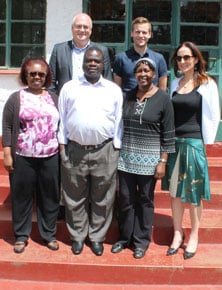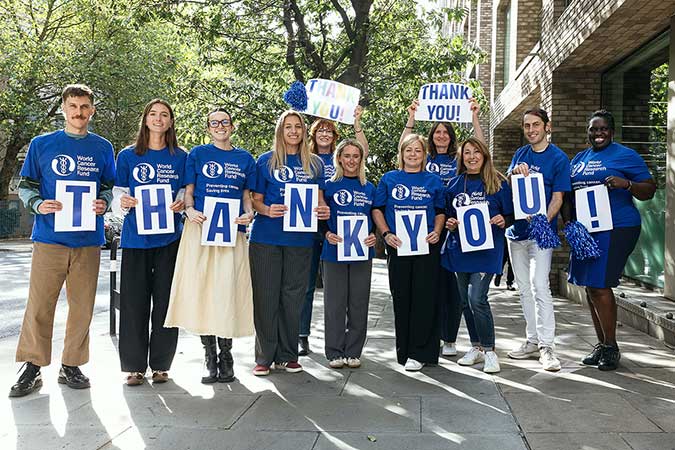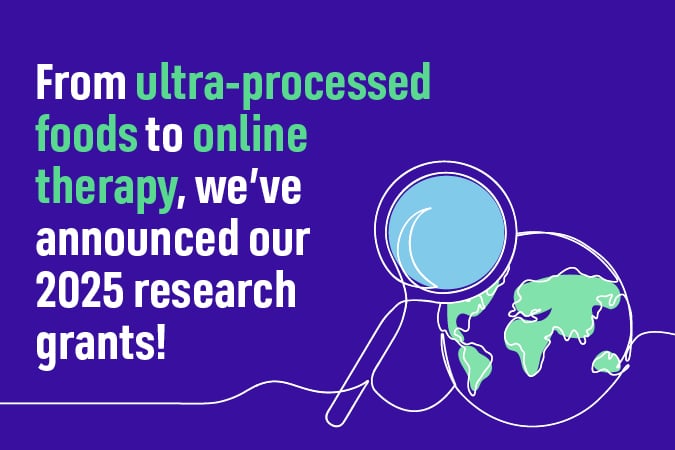- Grant awarded in 2018
Background
Oesophageal cancer is the seventh most common type of cancer worldwide and causes the sixth highest number of cancer deaths. In certain parts of the world, higher numbers of people develop oesophageal cancer than elsewhere; this is true for Africa, where 28,000 people developed oesophageal cancer in 2012.
The disease mostly affects east African countries, running north to south from Ethiopia to South Africa. There are two main types of oesophageal cancer, which differ by the type of cell in the body where the cancer starts. The type called oesophageal squamous cell carcinoma (ESCC) affects 90 per cent of the oesophageal cancer patients in this area.
Oesophageal cancer is often diagnosed after it is too late for treatment to be successful, leading to a low recovery rate. This makes it crucial to uncover the causes of oesophageal cancer and prevent it from developing in the first place.
Unsurprisingly, there are a number of dietary factors that are linked to this type of cancer, including alcohol consumption, low consumption of fruit and vegetables, low amounts of vitamins and minerals present in the diet, exposure to chemicals from burned and chargrilled food, and damage to the food pipe from hot food and drinks. Other factors include smoking, opium use, poor dental hygiene, animal contact, untreated drinking water, low income, and not eating a varied diet. Genetic factors may also play a role, in combination with people’s lifestyles.
Aims and objectives
The ESCCAPE study aimed to evaluate what lifestyle habits and environmental factors may be related to the high rates of ESCC in East Africa. In particular we were interested in whether ESCC patients in Africa might have developed their disease due to the consumption of alcohol, tobacco, hot food and beverage intake, and micronutrient deficiencies in the diet.
Methods
In Kenya, Malawi and Tanzania, we interviewed over 1200 patients who had been newly diagnosed with oesophageal cancer and we also interviewed the same number of healthy community members who had not been affected by this disease. The patient group and comparison healthy group were similar in terms of age, the broad region where they lived and sex. Each participant completed an interviewer-administered questionnaire for about 30 minutes.
Results
We found several modifiable lifestyle and environmental risk factors for oesophageal cancer in the East African setting. The evidence on oesophageal cancer aetiology points to essential contributions of alcohol, tobacco, hot beverages, biomass fuel, and poor oral health/hygiene, although more precise risk characterisation remains necessary.
We also found that hot beverage intakes were strongly associated with increased risk of oesophageal cancer. Lowering the beverage/food consumption temperature, allowing beverages to cool, sipping slowly and ensuring not to burn oneself while consuming hot food and drink are advisable.
Alcohol also appeared to be a substantial contributor to oesophageal cancer risk in east Africa, particularly among men, and a large fraction of oesophageal cancer could be prevented by stopping or reduction of alcohol consumption. We also identified higher risks among drinkers of high-alcohol distillations and spirits than among drinkers of low-ABV drinks, which is more prevalent among men than women.
Conclusion
Overall, there are several modifiable risk factors (alcohol, hot beverages) for oesophageal cancer in the East Africa setting which need to be included in public health messaging in affected countries. Further research is needed to understand the role and reasons for observations with oral health and why alcohol was not a risk factor in Malawi.
Impact
The findings from this study enhance the existing body of evidence and inform crucial actions for prevention. They were also taken up by the WHO Regional Office for Africa, as well as by national cancer control plans.
This research gained wide coverage across different news sites. Particularly their paper that highlighted hot tea as a risk factor was press released by both World Cancer Research Fund and IARC and featured on over 300 news sites.
Grant publications
- Middleton, Daniel R S, et al. “Alcohol Consumption and Oesophageal Squamous Cell Cancer Risk in East Africa: Findings from the Large Multicentre ESCCAPE Case-Control Study in Kenya, Tanzania, and Malawi.” The Lancet Global Health, vol. 10, no. 2, Feb. 2022, pp. e236–e245, https://doi.org/10.1016/s2214-109x(21)00506-4.
- Maritim, E., et al. “Hot beverages and oesophageal cancer risk in western Kenya: Findings from the ESCCAPE case-control study.” British Journal of Cancer, vol. 120, 2019, pp. 1109–1118, pmc.ncbi.nlm.nih.gov/articles/PMC6519248/.
- Van der Post, R., et al. “Missing and decayed teeth, oral hygiene and dental staining in relation to esophageal cancer risk: ESCCAPE case‐control study in Kilimanjaro, Tanzania.” International Journal of Cancer, vol. 149, no. 1, 2021, pp. 264–272, pmc.ncbi.nlm.nih.gov/articles/PMC8048942/.
- Wasswa, F., et al. “Geophagia and risk of squamous cell esophageal cancer in the African esophageal cancer corridor: Findings from the ESCCAPE multicountry case‐control studies.” International Journal of Cancer, vol. 150, no. 2, 2022, pp. 263–272, pmc.ncbi.nlm.nih.gov/articles/PMC8411422/.
- Gachago, C. M., et al. “A very-hot food and beverage thermal exposure index and esophageal cancer risk in Malawi and Tanzania: findings from the ESCCAPE case–control studies.” Cancer Medicine, vol. 11, no. 18, 2022, pp. 3530–3540, pmc.ncbi.nlm.nih.gov/articles/PMC9470732/.



